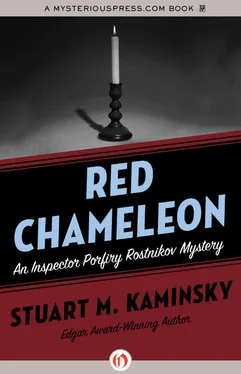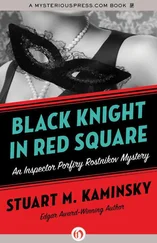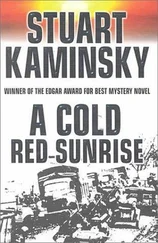Stuart Kaminsky - Red Chameleon
Здесь есть возможность читать онлайн «Stuart Kaminsky - Red Chameleon» весь текст электронной книги совершенно бесплатно (целиком полную версию без сокращений). В некоторых случаях можно слушать аудио, скачать через торрент в формате fb2 и присутствует краткое содержание. Год выпуска: 2012, ISBN: 2012, Издательство: MysteriousPress.com/Open Road, Жанр: Полицейский детектив, на английском языке. Описание произведения, (предисловие) а так же отзывы посетителей доступны на портале библиотеки ЛибКат.
- Название:Red Chameleon
- Автор:
- Издательство:MysteriousPress.com/Open Road
- Жанр:
- Год:2012
- ISBN:978-1-4532-6632-8
- Рейтинг книги:4 / 5. Голосов: 1
-
Избранное:Добавить в избранное
- Отзывы:
-
Ваша оценка:
- 80
- 1
- 2
- 3
- 4
- 5
Red Chameleon: краткое содержание, описание и аннотация
Предлагаем к чтению аннотацию, описание, краткое содержание или предисловие (зависит от того, что написал сам автор книги «Red Chameleon»). Если вы не нашли необходимую информацию о книге — напишите в комментариях, мы постараемся отыскать её.
Red Chameleon — читать онлайн бесплатно полную книгу (весь текст) целиком
Ниже представлен текст книги, разбитый по страницам. Система сохранения места последней прочитанной страницы, позволяет с удобством читать онлайн бесплатно книгу «Red Chameleon», без необходимости каждый раз заново искать на чём Вы остановились. Поставьте закладку, и сможете в любой момент перейти на страницу, на которой закончили чтение.
Интервал:
Закладка:
Two men in the rear of the elevator spoke in a whisper as Karpo’s elevator moved slowly upward. They were not from Moscow. Their accents were from the west, possibly as far as Kiev.
“Because if we go to the Berlin,” said one man with exasperation, “he’ll bloat, get drunk. We’ll get no business done.”
“So we’ll get no business done,” the other man countered in a high voice, “But we’ll get goodwill, and tomorrow they will owe us. Don’t be impatient.”
The two men got out at the sixteenth floor. By the eighteenth floor no one was left but Karpo and the operator. Elena said, “Floor,” recalling that the dispatcher had never extracted a destination from the man. Elena had the sudden chill feeling that the man might pull out something he was hiding in his sling and plunge it through her back. Her voice was high, quivering slightly.
“Top,” he said.
“Twenty,” she answered, and threw the lever as far to the right as it would go, knowing that there was no way to make the elevator move faster but willing it to do so. The elevator stopped with a jerk, and she reached over to throw the door open. Only then did she look back at the man, who said, “The roof. How do I get to the roof?”
Elena knew she should ask a question, challenge his authority, demand an explanation, but this was not a man one asked for explanations. It was a man you got out of your elevator and forgot as soon as possible. Elena was twenty-six years old and looked forward to twenty-seven and thousands of miles going up and down in the elevator and the movie she was going to see that night with her friend Nora.
“To the right, end of the corridor. There’s a stairway, but I don’t know if-”
The stiff man was already heading down the hall, his back to her, his secret protected by his hand, plunged into his wet sling. Elena closed the door without finishing her sentence. She planned to forget the encounter, at least till she could see Nora and build it into something more than it had been.
Karpo found the door without trouble. It was unmarked and unnumbered. He turned the handle and pushed. The heavy door gave way slowly. Had he been able to use his right hand, he could have-but he stopped that thought. One used what one had, overcame obstacles, did not weep when they appeared. He pushed the door open, went in, and moved up the concrete steps in near darkness.
There was a single light on the landing above. The light was a dull yellow and made his hand look jaundiced. The steps were clean and rough. On the floor above twenty, Karpo found himself in front of a metal door with a push bar. He pressed against it and stepped out onto the roof of the Ukraine. The wind slapped him and cracked the metal door closed with a clang. The rain had dwindled but not stopped. It pelted down on the flat pebbled roof, sending up an odor of strong warm tar that Karpo savored without quite making the sensation conscious. Above him for nine floors stood the front tower of the hotel with a star on its uppermost spire. He looked around, up, saw nothing, and heard only the rain brushing the roof and the slight wind.
There were turrets, outcroppings for air, heating, and simple decoration, many places to hide and wait, but no place to keep dry. Karpo did not expect to be there long. He strode to the edge of the building and looked over the low stone wall down at the bridge, the Moscow River, the city where he had spent his life. He felt himself merge with the building, could imagine himself disappearing, to be absorbed in the stone and the water. Perhaps he was a bit tired. If Colonel Snitkonoy were not a fool, an armed man would be up there now, but, Karpo decided, perhaps it was better this way.
He walked to a stone heating turret, stepped behind it, out of the line of vision of the door through which he had come, and demanded that his body ignore the throbbing, electric tingling in his right arm. He looked through the thinning rain at the modern building of the Council for Mutual Economic Assistance and the Mir (Peace) Hotel and let his breath take in the smell of his own humid sweat.
He heard the sound of someone coming before the door opened. When it did open with a loud clank, Karpo was standing well back, where he could see but not be seen.
It was the large woman in the dark flower dress. She looked like a ripe country melon, the kind his mother had purchased once or twice when he was a child. The thought in this circumstance led Karpo to reach up and touch his forehead, which confirmed what he suspected. He was feverish. His body was damaged, and his mind was not at its best. He came as close to smiling as was possible for him, but no one, with the possible exception of Rostnikov, would have detected it had they been with him.
The woman trudged forward toward the edge of the hotel roof, stopped, took a small bottle out of her pocket, removed some green pills, and threw them into her mouth. Then she turned her head upward to the sky to take in rain to wash down the pills. The rain hit her face, pushing her hair from her eyes and mouth, and for an instant Karpo thought there was the remnant of something in the woman’s face, something that might have been but had been burned away.
Her head came down, and she stood, arms folded at the edge of the building, looking down, waiting. They both waited for perhaps ten minutes, sharing the solitude. Then the rain began to ease, and within a minute it stopped. Behind him, Karpo could hear a bird singing as the woman knelt with some pain and opened her trombone case.
He waited till she lifted the rifle out, waited till she carefully loaded it, waited till she propped it up on the stone facade and looked down at the street, before he stepped out from behind the turret.
“No,” he said as the bird sailed past him, singing.
The woman was not startled. In fact, for an instant Karpo thought that she might not have heard him, that she might be hard of hearing or so preoccupied that his word did not penetrate her consciousness. Then she turned to him, and he could see her strange smile of satisfaction. The rifle in her hands, large and clumsy, came around in her large hands and aimed at him, smelled him out. Karpo stopped ho more than a dozen feet from her.
“You are a policeman,” she said. It wasn’t a question.
“I am a policeman,” Karpo agreed. “Assistant Inspector Emil Karpo of the procurator’s office. And you are-”
“A killer of policemen,” Vera said with defiance.
“Yes, what is the name of this killer of policemen?”
“Vera Shepovik,” she said, spitting out her own name with what sounded like hatred. “I don’t mind telling you. I’m going to kill you. I saw you following me. I hoped you would be here. I was afraid you wouldn’t. I-”
“I saw you compete in the university games three years ago,” he said. “At the Palace of Sports in Luzhniki. Javelin and-”
“Hammer,” she said. “I placed second in the hammer. That was my last competition.”
“You were very good,” he said. Karpo had no passion for sports, for athletic competition, but he did find satisfaction in the vision of athletes, Soviet athletes, who disciplined their bodies, drove them. It was something he respected, and so when Rostnikov had invited him to watch the competition, Karpo had agreed. Rostnikov had shown little interest in anything but the weightlifting, during which he talked constantly, pointing out nuances and tensions that Karpo could not discern.
“Do you want to know why it was my last competition?” she asked.
Karpo nodded.
“Because I discovered that I was ill, that I was poisoned, that steroids were eating away my organs from within.” She took one hand off the rifle to touch her stomach, to indicate where the process of decay was taking place. “They used me; the great Soviet state used my body, used me like a zombie, and then cast me aside to die without meaning when their experiment failed.”
Читать дальшеИнтервал:
Закладка:
Похожие книги на «Red Chameleon»
Представляем Вашему вниманию похожие книги на «Red Chameleon» списком для выбора. Мы отобрали схожую по названию и смыслу литературу в надежде предоставить читателям больше вариантов отыскать новые, интересные, ещё непрочитанные произведения.
Обсуждение, отзывы о книге «Red Chameleon» и просто собственные мнения читателей. Оставьте ваши комментарии, напишите, что Вы думаете о произведении, его смысле или главных героях. Укажите что конкретно понравилось, а что нет, и почему Вы так считаете.












